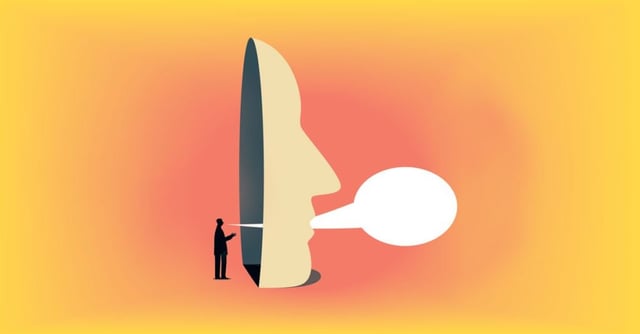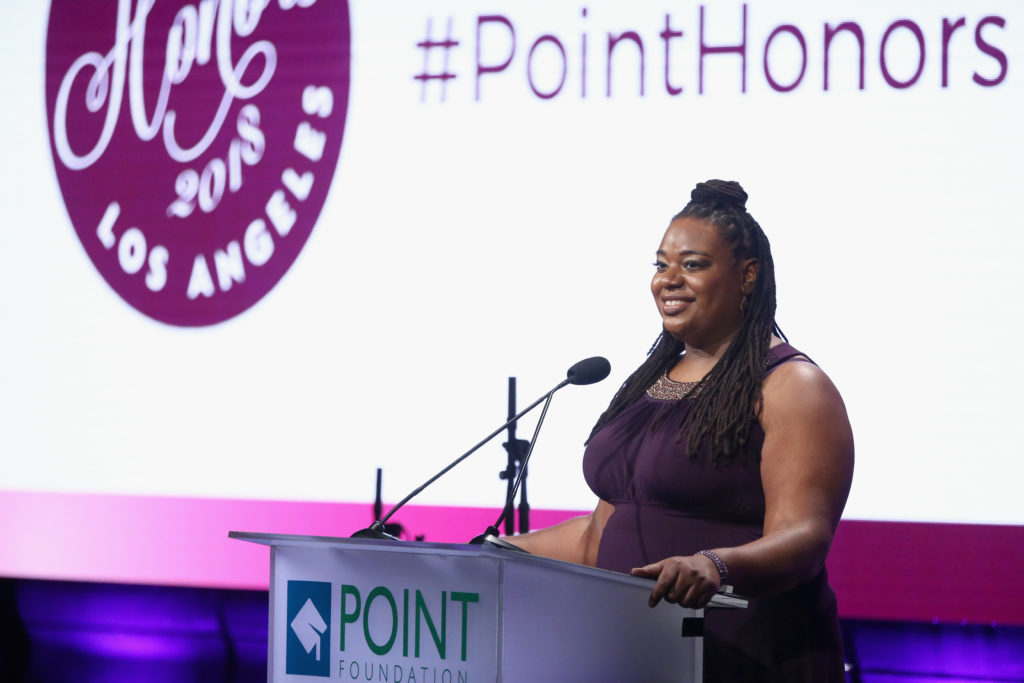On the evening of October 13, 2018, I gave a speech in the International Ballroom of the Beverly Hilton Hotel in Los Angeles. The room was packed with nearly hundreds of LGBTQ professionals, entertainers, writers, and dignitaries whose eyes and ears were transfixed on me. With clammy hands gripping the well-lit podium, I looked into this silent sea of faces and chronicled for them my remarkable journey from an abused black transgender foster youth to national child welfare expert, television consultant, and Point Scholar. I spoke highly of my adoptive fathers, both of whom were also in attendance, as they cried tears of joy and pride. Presenting to rooms of this size and stature has become a regular occurrence for me over the last few years - a testament to my storytelling and networking skills - but this speech was distinctive in that it felt like a penultimate full-circle moment. In this moment I was speaking from the purest, most authentic core of my potential.
As I walked off the stage, that feeling quickly ebbed and was replaced with anxiety. Something went wrong up there, but I couldn’t pinpoint the problem. I mentally replayed the speech over and again fearing I omitted some crucial bit of information, made glaring embellishments, or neglected to strike a more humble tone with the audience. I started to feel the sneaking suspicion I was an impostor who had just been exposed in front of the world. Nonetheless, I smiled and thanked all of the attendees - including the incomparable Janet Mock - who made it a point to congratulate me for a powerful and passionate oration.
In the weeks following, I took inventory of my accomplishments in 2018. Out of over 2,000 candidates, I was selected as a Point Scholar. I traveled around the country as a consultant trainer for Big Brothers Big Sisters of America while simultaneously completing my first semester at California State University, Los Angeles. I had raised over $1,200 for AIDS LifeCycle, and planned to embark on a 545-mile bike ride as captain of its very first all-transgender cycling team. Finally, my loving mentor of twenty years and his husband decided to make me a permanent fixture in their lives by legally adopting me.

"Janss Steps, UCLA" Courtesy of:
Brent Hellickson
These accomplishments were a string of pearls I wore proudly in front of my friends, colleagues, and classmates. I boasted about them on social media while everyone showered me with praise and described my life as “inspirational”. That inspiration was the only thing I wanted others to see. I wanted to be perceived as a happy, confident, and driven woman with a boundless future ahead of her. But those optics were impossible for me to genuinely sustain and, by February of this year, I had sunken into a deep depression. The reason? My personal life was imploding.
Over Thanksgiving, I had a major falling out with my adoptive parents. Beyond navigating my role as a new adoptee, there were long-standing issues we had not addressed before the adoption which ultimately showed up in conflicts. While my consulting work was professionally rewarding, I was also drowning in debt. Financial literacy had never been taught to me as a young adult and I was not managing money well at all. I was striking out left and right with men. Dating as a woman can be hard and sometimes risky. Dating as a black trans woman is harder and incurs even more, and sometimes deadlier, risks. All five of my AIDS LifeCycle teammates backed out of the ride and, without the bandwidth to find new recruits or energy and free time to train, I disbanded the team and quit altogether. Lastly, this past winter marked the 10th anniversary of my birth mother’s passing. This was an especially hard anniversary because, not only would she have turned 60 this year, I have no mutual family members with whom I can grieve or recall positive memories.
As problems in my life compounded and multiplied, I began feeling trapped and alone. I distracted myself with work and school, but it became increasingly difficult to hide my emotions. I was crying in airport bathrooms, flaking on my friends, and isolating in my bedroom for days. I no longer felt like a source of inspiration to anybody. I felt like a phony. The girl with so much happiness, confidence, and drive was really an impostor.

Courtesy of:
TED.com
And so I looked to therapy as a way to get clarity around these feelings. It has been the most cathartic internal work I’ve ever done. It is also the most challenging because it has required me to relinquish control of the optics and narratives I’ve created for myself. It forced me to consider my own role, assumptions, and patterns in the conflicts I was experiencing. It has provided a mirror to see the unrealistic expectations I’ve set for myself and others. Most importantly, I had to acknowledge that I feel shame about my trauma, family history, and mental health issues. My shame erected a shiny, decorative wall that looks nice but prevents anyone from seeing the other side, the real me. I fractured myself into two people: the former foster kid who hasn’t let go of the past, and the national child welfare expert who is focused on the future. Therapy has helped me begin to synthesize and accept these two realities as one. I am both accomplished and a work in progress. I am both grounded and someone recovering from trauma. I am both dependable and still learning how to trust and maintain healthy attachments. I am both an inspiration and a human being who needs to be inspired.
Looking back at last October, I’m now realizing I was supposed to give that speech at the Beverly Hilton. I knew I was flawed and complicated and still managed to exude confidence, poise, and Black trans excellence. I believed what I was saying and believed it would tap into the heart of every person in that room. This woman couldn’t have garnered tears and hugs from complete strangers unless she spoke from a place of unabashed authenticity. I wasn’t faking it until I walked off that stage and started doubting my mastery. That’s what made me an imposter. Not because I couldn’t synthesize my whole identity, but because I continue to resist ownership of my power. I pretend I haven’t faced a lifetime of discrimination and survived it all. I pretend I’ve never been riddled with fear and walked right past it to get what I needed. I pretend to not see my own shine and the glittering aura that abounds me. That’s the mindset I truly need to recover from. Now that therapy has given me a map, I can stop getting lost on my journey and continue striding toward self-acceptance and success.

This post was written by Herb Hamsher Point Scholar Nia Clark.
Nia is currently studying Social Work at California State University, Los Angeles. She plans to obtain her MSW and become a social work professor to continue teaching adults to affirm and support LGBTQ youth in systems of care. Read more about Nia here.

